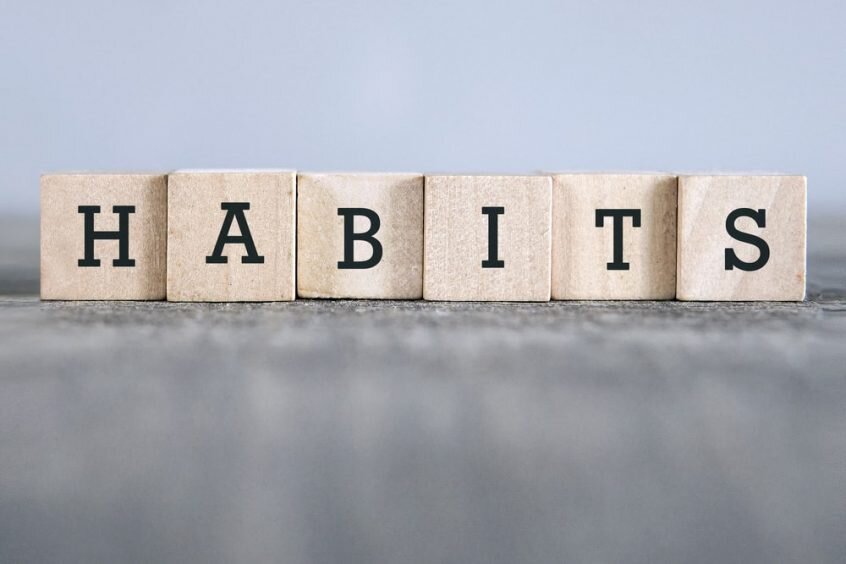How to create long-lasting habits?
“Your life today is essentially the sum of your habits. What you repeatedly do (i.e. what you spend time thinking about and doing each day) ultimately forms the person you are, the things you believe, and the personality that you portray.”
James Clear, Atomic Habits.
When the UK Lockdown 2.0 hit the news…. I thought, “Right, it’s time. Stop saying you are going to make changes and actually stick to something and follow through!”
I am one week into lockdown and so far, it is going relatively well. Not everything is going 100% to plan, but it’s not about winning every day, it’s about being as consistent as possible every day. Consistency will get me where I need to be and things that don’t quite come ‘naturally’ yet, will become habits in time.
Before we start talking about forming new habits, let’s start by defining what a habit actually is. Habits are behaviours that people repeat, are automatic and routine. These automatic behaviours generally feel familiar, easy and comfortable. I.e. Things we do naturally.
STEP 1: Know why you want to change your habits
If you don’t know why you are doing something, you will never stick to it. To choose a habit that you want to change or add, you first have to understand what you want to achieve. Long-lasting change happens when you’re self-motivated and that means it helps to be doing something you believe in.
Consider this; instead of being ‘outcome’ based, shift your mindset to an ‘identity’ based goal. If you say, “complete a marathon” (outcome based), you are likely to stop once the outcome is achieved. What if you said, “Become a person who enjoys running’s and goes out 3 times a week” (identity based), this will lead to a habit that will be engrained in your identity and thus, be ‘long-lasting’.
One of my choices was to do mobility through MapOnline a minimum of once a day. Why did I choose this as one of my habits? I would like to improve my mobility to make me a better athlete and reduce injury / discomfort BUT also, to ensure I have a body that will serve me well throughout my life and into old age.
STEP 2: Be realistic and start small
A habit you want to change can be wide ranging: stop biting nails, sleep more, drink less alcohol etc; it does not have to be fitness related. However, for the purposes of this blog and the fact that I am a Coach, let’s stick with running as an example. If you have never run before, choosing ‘run 1 hour a day for the next 28 days’ might not be very realistic. In this example, this person might benefit from a smaller and more realistic start “Run for 10 minutes 5 days a week, after each week increase the duration by 5 minutes”.
The point being, if the change is too big, it might be too difficult to achieve and then becomes overwhelming and discouraging. The repetitive nature of a task is what eventually forms a habit, therefore, the consistency in repeating the action is key. There is nothing wrong with starting small and adjusting the habit as you make progress.
STEP 3: What, why, how and when
Once you have understood the ‘identity’ you want to be, grab a pen and paper and make sure you can answer the following questions of your potential new ‘habits’ or ‘behaviours’.
WHAT do you want to change?
WHY do you want to change it?
HOW will you change it (ie. What is the action)?
WHEN do you want to achieve this by? This last one can vary greatly depending on what
Again, keep in mind:
Long-lasting change happens when you believe in something.
Be realistic and start small.
Consistency is key.
For example:
WHAT: I want to be a runner
WHY: To be a healthier version of myself and develop a skill that needs no equipment
HOW: Run 10 minutes a day for 5 days (increasing each week by 5 minutes)
WHEN: To be reviewed in 4 weeks.
Once you have completed this task, you should feel that you truly understand the habit you want to change, as well as the meaning and importance of this habit to you.
Side Thought: I am aware that the habits and examples I have used are all based on tangible things. We could go further down the rabbit hole, considering the difference between tangible & intangible habits and how to apply these concept to intangible habits as well. For example, ‘feel less anxious’ or ‘be more assertive’. It’s definitely doable, if you want to chat it through, message me on thea@thfitness.co.uk.
STEP 4: How to stay on track
"The man who complains about the way the ball bounces is likely to be the one who dropped it."
Lou Holtz
Staying on track is simple, but it isn’t necessarily easy. Compliance can be difficult because it’s easy to make excuses which divert your attention. Remember, you choose these habits founded on what is really important to you and in the idea of the person you would like to become. If this is something you really want, you need to prioritise this above other distractions.
There are a few tips and tricks which might help keep up the momentum:
Go arts & crafts and create your own ‘habits tracker’. Here is a link to my post when I shared my homemade one.
Buy a lovely ‘habits tracker’ and support a local business. Check out this one from Etsy.
There are plenty of tracking apps - Momentum Habit Tracker, Habit, etc.
Partner up with a friend who wants to do the same thing. Check in each day to discuss how it’s going.
If you already work with a PT/Coach, ask if they will help keep you accountable.
I have stuck mine firmly on my fridge, every time I complete a habit for a day, I highlight it. Simple, but it works very well for my OCD. I plan to get to the end of lockdown and have managed a 90% compliance rate. If you are interested in hearing how I get on, sign up to the newsletter at the bottom of the page.
A little secret….. Another trick for accountability, write a blog about habits and tell everyone you know what you are doing. No hiding there.
Good luck to anyone who is making these changes and please keep me posted on how you are getting on.




